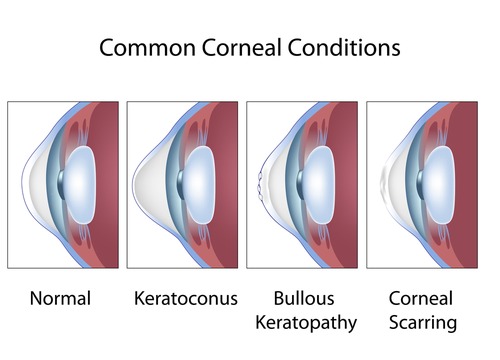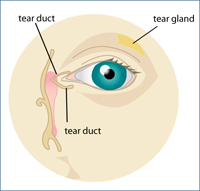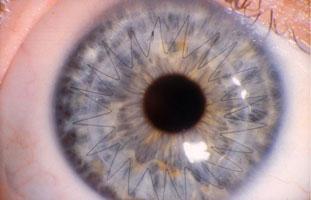Consulting Ophthalmologists, P.C. located in Farmington and Glastonbury Connecticut provides medical and surgical care for all Corneal and External Diseases. Most patients are referred to a Corneal Specialist by their primary eye care provider for consultations. However, self-referrals for second opinions are most welcome.
Conditions requiring medical treatment include many inflammatory and infectious diseases. Careful history-taking, meticulous examination, and appropriate testing usually provide the information needed to make the correct diagnosis and implement the proper medical therapy.
Topical therapy with prescription eye drops is most often prescribed, but occasionally systemic therapy (i.e. pills) is indicated. Most medical conditions are short-lived and resolve without permanent sequel. However, some are chronic, incurable and sight-threatening. You will be informed by your ophthalmologist about the likely outcome of your condition, but no guarantees can be made due to the inherent uncertainty of medical treatment. Working together, you and your corneal specialist will usually achieve a satisfactory result.

Dry eye syndrome is an extremely common eye condition caused by either insufficient tear volume or poor tear quality. Three primary glands produce the components of tears, so if any of these are not functioning properly, due to inflammation or otherwise, dry eye will often occur.
Symptoms:
If you are experiencing dry eye syndrome, schedule an appointment at Consulting Ophthalmologists today to discuss your treatment options!
Conjunctivitis occurs when the conjunctiva (the thin, transparent tissue that lines the inner surface of the eye), is either inflamed or infected. Conjunctivitis, also commonly known as “pink eye”, is extremely common, and in some forms can be highly contagious. Frequently caused by viral or bacterial infections, it can also be caused by irritants in the air.
Those with conjunctivitis often experience the following symptoms:
If you or a loved one is experiencing the symptoms of conjunctivitis, please call our offices in Farmington and Glastonbury Connecticut today or request an appointment. The treatment of conjunctivitis can increase comfort, lessen the infection or inflammation, and help to prevent the spread of the infection to others.
Some conditions require surgery, usually outpatient, to treat them. Medical therapy is often provided concurrently. Surgical corneal disorders may cause both impaired vision and pain. Any disorder that results in decreased clarity or sphericity of the cornea will cause impaired vision. If medical therapy alone is ineffective in preventing or reversing the corneal abnormality surgery may be necessary.

Occasionally surface procedures such as corneal debridement (i.e. polishing) or superficial keratectomy are helpful. However, most disorders resulting in significant clouding or irregularity require corneal transplantations for visual rehabilitation. The two principal techniques include Penetrating Keratoplasty and Descemet’s Stripping Automated Endothelial Keratoplasty (DSAEK, a partial thickness transplant technique). The anatomy of the corneal pathology determines which technique is appropriate in each case. Cataract extraction and intraocular lens procedures are often combined with keratoplasty surgery.
Another common corneal condition requiring surgery is Pterygium, a benign growth that extends from the white of the eye. Conjunctival autotransplantation is usually performed to minimize recurrence. The appropriateness of corneal surgery will be provided by the corneal specialist. The patient will be provided as much information as possible to make an informed decision. As with medical therapy, no guarantees can be made about outcomes. Of note, corneal surgery is more unpredictable than routine cataract surgery.
If you wish to be evaluated for a Corneal or External Disease condition, please call our office and you will be directed to the appropriate Corneal Specialist.
Blepharitis is an inflammatory condition of the eyelids and is a common cause of eye irritation or burning. It is generally not sight-threatening. Long-term treatment may include daily eyelid cleansing routines and treatments for infection and inflammation.
Dry eye, rosacea, and dermatitis are common in people with blepharitis. Changes in the oil glands (meibomian glands) are also common in certain forms of blepharitis. This can cause a burning sensation and contribute to dry eye.
The first step in treatment is lid hygiene, which includes warm compresses, lid massage, and eyelid scrubs. One option is to apply warm compresses to the eyelids for a few minutes, two to four times daily. Eyelid scrubs with a wet washcloth with or without a few drops of baby shampoo help to clear away debris that has accumulated on the edges of the eyelids. Don’t scrub too vigorously as this may cause irritation.
Other treatments include antibiotic ointments such as bacitracin or erythromycin. Oral antibiotics such as doxycycline can be helpful for meibomian gland dysfunction, especially in people with rosacea.
Short courses of steroid drops or ointment (with or without antibiotic) can be helpful for symptom relief if there is significant inflammation. The minimally effective dose with the shortest duration of use should be used to reduce the risk of glaucoma and cataracts.
Since many blepharitis patients have dry eye, artificial tears may improve symptoms. If artificial tears are used more than four times per day, preservative-free tears (in individual vials) are recommended.
Omega-3 supplements (usually fish oil) can be helpful for meibomian gland dysfunction and reducing dry eye symptoms.
499 Farmington Avenue, Suite 100
Farmington, CT 06032
Office Telephone: 860-678-0202
295 Western Boulevard
Glastonbury, CT 06033
Office Telephone: 860-678-0202